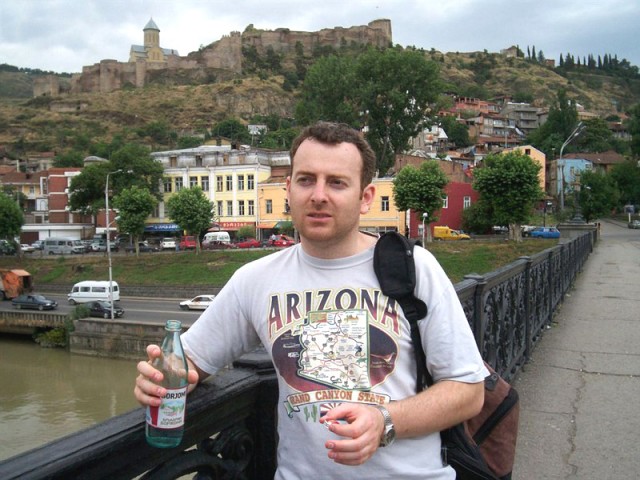
Analysis by Emil Sanamyan
Aleksandr Lapshin, a travel writer holding Israeli, Russian and Ukrainian citizenship, was arrested in Belarus and extradited to Azerbaijan on February 7. The authoritarian leader of Belarus was apparently acting on a personal request from his Azerbaijani counterpart. Shortly before Lapshin’s arrest in Minsk on December 13, 2016, Aleksandr Lukashenko met Ilham Aliyev to seek “discounted” Azerbaijani oil sales to Belarus.
Jailed now for over three months now, Lapshin is facing charges of “illegal entry” into Azerbaijan and “making calls” against the Azerbaijani state. As has become the norm in the post-Soviet space, Azerbaijani officials have ignored requests from the OSCE, Amnesty International and the Committee to Protect Journalists to cease its crackdown on free speech and, specifically, to release Lapshin. Diplomatic interventions by Russia and Israel have not helped either.
The Karabakh Black List
Most commentators see Lapshin’s prosecution in the context of his trips to Nagorno Karabakh in 2011 and 2012. The Azerbaijani leadership claims Nagorno Karabakh as its territory taken away by Armenia and calls all forms of human activity there “illegal.” This includes foreign tourism, media reporting and travel writing. Thousands of people visit Karabakh annually, but so far only several hundred have been added to Azerbaijan’s Black List of people consequently prohibited from visiting Azerbaijan. Lapshin is among them.
There are two main reasons for this disparity in numbers.
First, the majority of visitors to Karabakh are ethnic Armenians from other countries and they are already prohibited from visiting Azerbaijan by virtue of their names and independent of their citizenship. Those who end up crossing into Azerbaijan, get arrested. In one recent case, Marat Ueldanov, a Baku-born ethnic Armenian and a Russian citizen who took on his wife’s last name and worked for the Autograph hotel in Baku, was jailed in Azerbaijan since June of last year.
Second, not all visits by non-Armenians to Karabakh become news. Most of the times those blacklisted are politicians or prominent cultural figures, perhaps most famously Spanish opera singer Montserrat Caballé, rather than regular tourists.
Why did the Aliyev regime go after Lapshin?
Of more than 400 people on the Black List, Azerbaijan has zeroed in on Lapshin, a popular blogger but certainly not the most prominent figure in that list. Why?
Lapshin never took sides in the Karabakh conflict and wrote with sympathy for Azerbaijanis. Lapshin’s trips to Karabakh would likely have continued to be a non-issue, had it not been for his writing. In June 2016, Lapshin went to Azerbaijan on its government’s invitation and while he was on the black least. During that trip, he published several long blog entries about his visit while still in Baku. Those included a photo report from Baku slums not far from the upgraded city center promoted by the Aliyev regime as the new face of the country.
After leaving Azerbaijan, he publicly derided its officials and even the “national leader” Heydar Aliyev. Azerbaijani officials take such public offenses to heart. Just months earlier, two local young men were arrested for writing offensive political graffiti on the Aliyev monument in Baku; they were since sentenced to ten years in prison.
In July 2016, Azerbaijan launched a manhunt for Lapshin and eventually in December had him ambushed in Minsk. (Lapshin announced his trip to Belarus on his blog days in advance.) In five months between July and December, Lapshin traveled to a dozen, mostly European countries, including Georgia and the Baltic states, but officials there refused to heed Azerbaijan’s requests for his arrest or possibly did not receive them.
While most Azerbaijanis, Armenians and others, put the Lapshin story in the context of the Karabakh conflict, the Baku graffiti writers never visited Karabakh, but are in prison anyway. Even without traveling to Karabakh, had Lapshin only traveled to Azerbaijan and written what he had, he would still likely be in trouble with the regime.
The Fatullayev precedent
A full decade earlier, the Azerbaijani government already used a trip to Karabakh to prosecute one of its most vociferous critics at the time, journalist Eynulla Fatullayev. Fatullayev visited Karabakh in February 2005 and filed a trip report that was controversial in Azerbaijan. But even before that trip, Fatullayev had been prosecuted for his writings and assaulted in the streets. In March 2005, only weeks after Fatullayev’s trip, his editor Elmar Huseynov was assassinated. The following year, Fatullayev suspended publication after his father was kidnapped. It was not until 2007 that he was formally charged with “slander” over his Karabakh reporting and sentenced to prison.
There is little doubt that the main reason for Fatullayev’s harassment was not the trip to Karabakh, but his reporting on Azerbaijani politics. Following his release from prison, Fatullayev has changed direction and is now known for his articles attacking anti-government politicians and activists, particularly officials suspected of disloyalty.
Fatullayev’s prosecution, however, also had another effect. For over a decade, no Azerbaijani journalists, not even from dissident media working from relative safety of Europe, have dared to visit Karabakh.
What is notable is that by framing Lapshin’s arrest as part of the nationalist agenda, the Azerbaijani government succeeded in muting virtually all domestic criticism of the case. A prominent investigative journalist Khadija Ismayilova, defended by Amal Clooney and herself only just released from prison after international pressure, tweeted in support of Lapshin’s arrest.
So far, Lapshin’s prosecution has not deterred visits to Karabakh, if that was the intention. Earlier this month, a group of travel bloggers, including those from Belarus, Israel and Russia, went to Karabakh, primarily to protest Lapshin’s arrest. The blogger remains jailed in Baku, his fate uncertain.
9/14/2017 UPDATE
After being sentenced to three years in prison, Lapshin was pardoned by Ilham Aliyev and returned to Israel. According to reporting by Haaretz, Aliyev’s decision came unexpectedly for Israel’s embassy in Baku. The pardon coincided with Azerbaijani-Israeli talks over weapons contracts and followed Lapshin’s beating in his prison cell.










